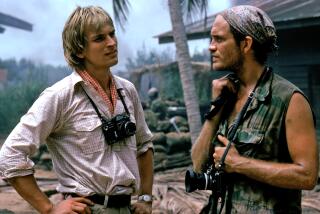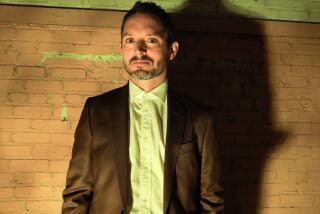‘Willard’ remake is overrun by effects
- Share via
What’s most intriguing about New Line Cinema’s “Willard,” a hard-edged remake of the 1971 release of the same name is how the movies have changed over the past three decades.
Of the original film, directed by the late Daniel Mann, it was possible to write: “No wonder ‘Willard’ has been called the sleeper of the summer season: One could not ask for a more satisfying yet less pretentious hot-weather suspense-horror entertainment.” It’s a description that could never be applied to the new “Willard,” which has taken the original’s humanity and the psychological validity, leavened with a dollop of dark humor, and replaced them with a technically impressive but essentially heartless spoof.
Aiming at a broad, youthful market, New Line’s writer-director Glen Morgan (“Final Destination”) may well have figured that today’s audiences could not be expected to take seriously the premise that a disturbed young man could actually speak to and be understood by rodents and decided that it would be better to play the premise for laughs and for special effects involving spectacular, relentless attacks by legions of rats. Morgan’s approach may prove to be right at the box office, but the result is a far less emotionally engaging film than the original.
The first Willard, Bruce Davison, was a hapless young man of normal appearance who was easy to root for when he discovered that he could exact revenge on his tormentors via an army of rats plaguing his seedy family mansion. Their leader was a highly intelligent rodent named Ben, who acted at Willard’s command. The new Willard is Crispin Glover, a gifted, high-intensity actor whose handsome but distinctive sharp features easily photograph as weird or dangerous. In an instant this Willard reads as a crazy with no place to go but crazier. (In a nod to the original film, Willard’s late father is seen in an oil painting of Davison.)
The plots of the two films are virtually identical. Willard lives in a gloomy, decaying mansion with his awful, ailing mother (Jackie Burroughs), who is alternately belittling and possessive. Willard works at a dreary factory in a menial office job, where he is terrorized and humiliated by his boss (R. Lee Ermey, just as effectively crude and ruthless as Ernest Borgnine was in the original), who had destroyed his partner, Willard’s late father. Office temp Cathryn (Laura Elena Harring) offers Willard kindness, but Cathryn’s well-meaning dimness is played for laughs.
Willard’s mother in the original, Elsa Lanchester, was able to show some humanity in her unsympathetic character, but Burroughs registers only as a hateful, wraith-like witch; it is impossible to believe her son could ever have had love for her. The key plot change is that the new Willard has discovered that it is a white rat, whom he names Socrates, with whom he can communicate. Socrates becomes Willard’s only friend and can lead the pack, but his commanding officer is the now-ferocious, rabbit-sized and independent Ben. (Amusingly, the theme song, “Ben,” heard in the sequel to the original “Willard” and sung by Michael Jackson was a paean to friendship, but here it’s used to ironic effect.)
In press materials Glover alluded to “Hamlet” and Freud, and Morgan to Hitchcock, but this “Willard” does not invite such considerations of complexity and pathos. For all its pretense, it’s just another energetic, atmospheric horror-comedy designed for mall cinemas before moving on to a video afterlife.
*
‘Willard’
MPAA rating: PG-13 for terror, violence, some sexual content and language.
Times guidelines: Too intense for the very young.
Crispin Glover...Willard
R. Lee Ermey...Mr. Martin
Laura Elena Harring...Cathryn
Jackie Burroughs...Mrs. Stiles
A New Line Cinema presentation of a Hard Eight Pictures production. Writer-director Glen Morgan. Based on a screenplay by Gilbert Ralston and the book “Ratman’s Notebooks” by Stephen Gilbert. Producers James Wong, Glen Morgan. Executive producers Bill Carraro, Toby Emmerich, Richard Brener. Cinematographer Robert McLachlan. Editor James Coblentz. Music Shirley Walker. Costumes Gregory Mah. Production designer Mark Freeborn. Art director Catherine Ircha. Set decorator Mark Lane. Running time: 1 hour, 40 minutes.
In general release.
More to Read
Only good movies
Get the Indie Focus newsletter, Mark Olsen's weekly guide to the world of cinema.
You may occasionally receive promotional content from the Los Angeles Times.








